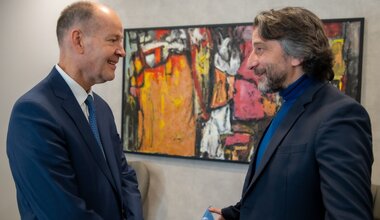SECURITY AND GENDER GROUP URGES NEWLY ELECTED POLITICAL LEADERS TO ADHERE TO GENDER EQUALITY COMMITMENTS
On the 19th anniversary of landmark United Nations Security Council resolution 1325 on Women, Peace and Security, the Security and Gender Group underlines that the inclusion and meaningful participation of women is a necessary condition for peace, stability and democratic development.
In the lead up to the announcement of the final results of the 2019 Kosovo early legislative elections, the Security and Gender Group reminds political parties of their obligation to ensure equal representation of women and men during and after the electoral process in accordance with Law No. 05/L-020 on Gender Equality which stipulates that:
- “Legislative, executive, judicial bodies at all levels and other public institutions shall be obliged to adopt and implement special measures to increase representation of underrepresented gender, until equal representation of women and men according to this Law is achieved” (Article 6, paragraph 7);
- “Equal gender representation in all legislative, executive and judiciary bodies and other public institutions is achieved when ensured a minimum representation of fifty percent (50%) for each gender, including their governing and decision-making bodies.” (Article 7, paragraph 8).
The Security and Gender Group regrets that in their lists of candidates, political parties opted to apply the minimum standards set out under the Law No. 03/L-073 on General Elections, rather than aiming to advance full gender equality representation by adhering to the Law on Gender Equality. This was despite concerns raised by women’s rights organisations and a court challenge raised by the Ombudsperson in which he emphasized that provisions of the Law on Gender Equality as lex specialis have preeminence over provisions of Law on General Elections. The Security and Gender Group underlines the urgent need for the Law on General Elections to be harmonized with the Law on Gender Equality so that Kosovo is well-positioned to achieve a higher standard for women’s representation in politics and decision-making.
While there was a slight increase in the number of women candidates in the Early Legislative Elections from 31.1 per cent in 2017 to 31.2 per cent in 2019, the preliminary report of the European Election Observation Mission concluded that political platforms did not sufficiently address gender issues and women’s turnout in the rallies observed averaged 23 per cent while female speakers accounted for 22 per cent of the total speakers at observed rallies.
Equal participation of women and men in decision-making is a necessary condition for the better functioning of a democratic society and political parties have a key role to play as the “gatekeepers” of democracy and women’s participation. This is also an essential condition for Kosovo institutions to fully observe international and regional standards as reflected in CEDAW and EU acquis communautaire. The Security and Gender Group therefore urges all elected political leaders to step up their efforts to address underrepresentation of women in decision-making, particularly at senior levels. In this regard, the Security and Gender Group encourages elected leaders to adhere to a minimum standard of 50 per cent representation of women in government institutions in line with requirements set out under the Law on Gender Equality. Such measures will ensure that the new government fully respects and represents the views of all women and men in Kosovo.
Note:
The Security and Gender Group (SGG) is a multi-stakeholder group, chaired by UN Women.
The following members of SGG support this advocacy letter: EU Office in Kosovo/ EUSR, UN Development Coordinator (UNDCO), UN Women, UNICEF, UNDP, UNHCR, UNFPA, UNMIK, IOM, EULEX, British Embassy, Embassy of Finland, OSCE, Kosovo Women’s Network, Kosovo Police, Kvinna till Kvinna, YIHR, KIPRED, Kosovo Gender Studies Center, Kosova – Women 4 Women, Women's Rights.
 UN
UN United Nations Peacekeeping
United Nations Peacekeeping




